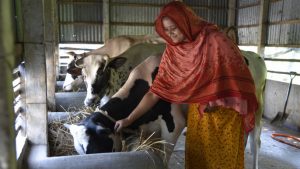Everything from blizzards to hurricanes.
The pandemic has been a different type of crisis.
“Near two years, we’re still in the middle of the storm,” said Cooper, the co-op’s director of operations and member services.
Leaders from Northeastern dairy processors discussed current pandemic-related challenges Sept. 21 at the Dairy Financial and Risk Management Conference presented by the Center for Dairy Excellence.
One of processors’ biggest concerns is staffing.
Dairy Farmers of America has the most job openings it has had in its history, said Jennifer Huson, the co-op’s senior director of council affairs and industry relations.
Cooper said he knows of a business that installed a new string cheese line but couldn’t find anyone to run it.
And Chuck Turner, president of Turner Dairy Farms in Pittsburgh, said his company is part owner of a small plant that, at the time of the conference, had almost half of its employees out sick.
On the customer side, staffing shortages are also limiting restaurants’ hours. That holds back dairy sales, he said.
Meanwhile, supply chain issues have led to tight supplies for plastic resins to make bottles and labels. And as the holidays approach, there’s a shortage of capacity to bottle ultra high temperature products like cream and egg nog, Turner said.
In general, the pandemic has heightened the sense of the dairy supply chain’s fragility. As Cooper put it, milk processing is dynamic but not nimble.
The industry produces a host of products, from bulk packages to single-serve cups, and serves both domestic and foreign markets. Yet the cost of equipment prevents individual companies from making products in every size, and milk remains a perishable raw material that needs to be kept cold.
With plants running 24 hours a day, there’s little leeway to deal with disruptions, Turner said. Plants don’t keep much in the way of product inventory, and even if they wanted to, they wouldn’t have storage space for it.
“A lot of these gains that we have in efficiency have been at the expense of resiliency,” Turner said.
It would be ideal for the dairy industry to be prepared when the next black swan event happens.
If necessary, processors could return to strategies used in the spring of 2020 — limiting product selection, donating excess, amending base programs — but it’s not clear what actions will be called for.
“I don’t think there’s a magic bullet or even a strategy because we don’t know what the next event’s going to be,” Cooper said.
As a broader policy, Turner said, companies need to do business with people they trust.
“If your customers and your suppliers are working with you, you’re going to be able to solve it. And if they’re working against you, you’re going to have problems,” he said.
Base programs create disincentives for farmers to produce milk beyond a certain amount. Many cooperatives used the programs to adapt to demand destruction during last year’s lockdowns, though co-ops had been using similar measures even before the COVID-19 era. The pandemic isn’t the first time the Northeast has run into milk overproduction problems in the past decade.
Still, the speakers stopped short of saying their farmers can’t expand.
Discussing a move with the co-op ahead of time is ideal because it gives the co-op time to adjust, Cooper said. If a farmer calls and says the farm is adding cows next week, the co-op can’t always accommodate because a truck might not be available.
To ensure the future of the Northeastern dairy industry, Cooper said farmers in the region need to increase milk production per cow.
“If we look at us against the rest of the nation, we’ve got to get better,” Cooper said.
Huson agreed that dairies should focus on efficiency, not just adding cows or increasing milk production. Farmers should ask themselves, “How do I do my job better, faster, quicker?” she said.
Rather than expand the herd to bring a child back to the farm, the family could steer that person to a farm-related job like milk hauling. And it wouldn’t hurt to improve the farm lane to allow easy tanker access, Huson said.
Turner said dairy farmers should consider diversification. He buys milk from farms that also grow pumpkins and potatoes, make artisan cheese, and grow and blend bird seed.
The industry should also capitalize on consumers’ appreciation for Pennsylvania’s farming tradition.
“It’s the kind of farms (consumers) imagine or would hope for,” Turner said.













